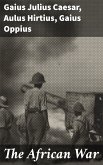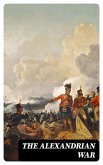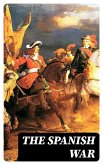The African War anthology presents a profound exploration of the tactical and political intricacies of war during ancient Roman times, with particular focus on Julius Caesar's campaigns in North Africa. This collection encompasses a varied range of narrative styles-from detailed prose recounting strategic military maneuvers to more reflective narratives on leadership and governance. Its significance lies not only in its rich historical content but also in the diverse literary techniques employed to capture the complexity of the African conflict, providing an essential glimpse into ancient military history. Contributing authors, including noted figures such as Gaius Julius Caesar, Aulus Hirtius, and Gaius Oppius, bring their distinct perspectives to the anthology. Each author provides a unique angle on the themes of leadership, warfare, and diplomacy, enriching the narrative tapestry of the African conflicts. The collection aligns with the broader Roman historiographical tradition, amplifying the voices of its contributors while illuminating the power dynamics of the era. The diverse backgrounds of the authors-spanning military, political, and historical domains-enhance the depth and authenticity of the accounts. Recommended for both scholars and enthusiasts of Roman history, The African War offers an unparalleled opportunity to engage with multiple viewpoints and literary styles within a single volume. Readers are invited to immerse themselves in the historical narrative, gaining valuable insights into the strategic minds that shaped Roman history. This anthology provides educational value through its broad spectrum of insights, fostering a rich dialogue between the stories and the storied past they elucidate.
Dieser Download kann aus rechtlichen Gründen nur mit Rechnungsadresse in A, B, BG, CY, CZ, D, DK, EW, E, FIN, F, GR, H, IRL, I, LT, L, LR, M, NL, PL, P, R, S, SLO, SK ausgeliefert werden.









